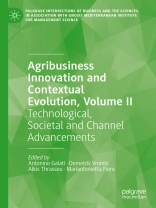Agriculture is the oldest and most traditional of economic sectors, and its business has seen major leaps in innovation over the past century. Contemporary agribusiness is being influenced and reshaped by technological developments, geopolitical developments, and globalisation, as well as transport and logistics innovations, changes in consumer behaviour.
Reflecting on these changes and providing a deep dive into this sector, this two-volume work defines, refines, analyses, and prescribes the evolution of agribusiness in the present and future. Taken together, the books offer a comprehensive conceptualisation of the multifactorial macro, micro and organisational elements of agribusiness, including strategic, managerial, marketing, technological and geo-socio-political forces.
Volume II focuses on the wider, macro-environmental forces acting upon agribusinesses, exploring the contextual evolutions that impact the sector, and the means, practices and avenues for its development.It includes topics such as digital technologies adoption, supply chain sustainability, big data analytics, women’s agricultural entrepreneurship, and simulation model decision making.
Tabela de Conteúdo
Chapter 1. Overview of agribusiness managerial and marketing advancements.- Chapter2. Acceptance and Adoption of Emerging Digital Technologies by Agribusinesses in Low and Middle-Income Countries.- Chapter 3. The Italian agrifood supply chain sustainability through technological heritage redesign and new relationships.- Chapter 4. Using big data analytics in supply chain management: implications from a sustainable perspective.- Chapter5. Towards a taxonomy of multi-agent simulation models to determine disruptive technology adoption behaviour in the wine industry .- Chapter 6. Digitalization and integrated information system in agri-food sector.- Chapter 7. Transforming rural agribusinesses with Digital Marketing: a case of coffee planters in India .- Chapter 8. Tourist entrepreneurship as the driver for the transformation of rural women’s role – the example of the selected developing region .- Chapter 9. Investigating the supply chain performance of agribusiness firms from IT capability and government support perspectives.- Chapter 10. Do blockchain-based innovative solutions improve wine brand loyalty? A case study of a winery in Mendoza, Argentina.- Chapter 11. Economic indicators in cereal production in EU.
Sobre o autor
Antonino Galati is Associate Professor in Agricultural Economics and Valuation in the Department of Agricultural, Food and Forest Sciences, University of Palermo, Italy.
Mariantonietta Fiore is Professor in Agricultural Economics and Valuation in the Department of Economics, University of Foggia, Italy.
Alkis Thrassou is Professor and Director of Gnosis Mediterranean Institute for Management Science at the University of Nicosia, Cyprus.
Demetris Vrontis is Professor in the Department of Management, School of Business, University of Nicosia, Nicosia, Cyprus and in the Department of Management Studies, Adnan Kassar School of Business, Lebanese American University, Beirut, Lebanon. He is Vice Rector for Faculty and Research at the University of Nicosia in Cyprus, as well the Editor-in-Chief of the
Euro Med Journal of Business (EMJB) and the President of the Euro Med Research Business Institute (EMRBI)












